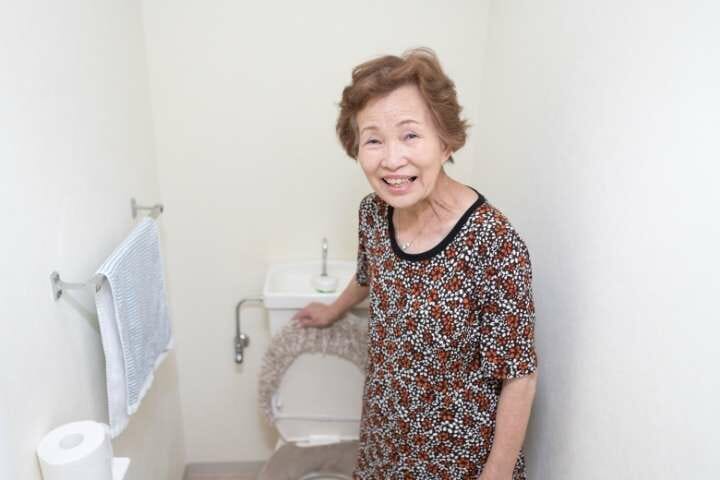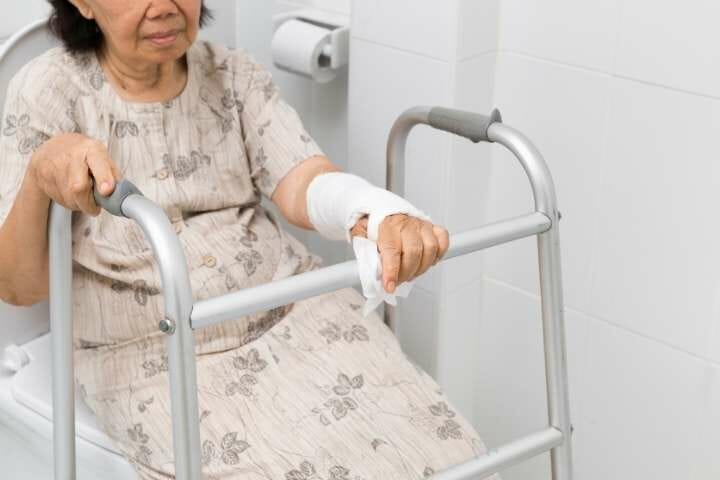If your loved one has been diagnosed with dementia you may have noticed that their use of the bathroom has greatly increased.

At first, you may not believe that these two things are related. Perhaps they have a urinary tract infection or issues with their bladder.
This pattern, though, is very common among patients with dementia so you are not alone in worrying about your loved one.
As people age, incontinence and bathroom troubles becomes much more common and it can cause issues with their every day living and ability to have a quality of life.
This can be an issue that is really difficult to talk about with your loved ones, but there is support available in resources for how to help your loved one work through this issue.
What, exactly, is incontinence?
When someone has incontinence, it is the unintentional leakage of urine or fecal matter or sometimes both.
Urinary incontinence
This can be a small, occasional leak of urine, a continue leak of urine after using the bathroom or a complete loss of bladder control.
There are a few different types of urinary incontinence, but the one the is most commonly associated with dementia is what’s known as an overactive bladder. This will cause the feeling of a sudden and intense need to pee, and/pr frequent peeing.
Women in particular are more likely to have another type of incontinence known as stress incontinence which can be brought on by pregnancy and childbirth. This usually happens with a cough or a sneeze, and a small amount of urine leaks out. This can get worse as women age, and it with an overactive bladder associated with dementia it can be that much worse.
Fecal incontinence
This type of incontinence can vary from leaking a small amount of poo when passing wind to having absolutely no bowel control at all.
This type of incontinence is far less common than urinary incontinence, but when it does happen it affects men and women equally. You may use Incontinence Pads for your leak protection.
You might like to read: What Is Functional Urinary Incontinence
Why does someone become incontinent?
There are a number of reasons why someone becomes incontinent, and the reason for each person could be different.
You may not have noticed if the incontinence started before or after the diagnosis of dementia, so it may not seem like it’s related at all.
The reason for incontinence could be due to

UTI (Urinary Tract Infection)
This happens when bacteria gets into the urethra and it can lead to an infection of the bladder or kidneys. The symptoms of a UTI can include a burning feeling when peeing, the sudden and immediate urge to pee, a fever and urinary incontinence.
The good news is that this can usually be treated with antibiotics so it’s not permanent and can definitely be fixed.
Constipation
This condition can make it very difficult to empty and control the bladder. Constipation is also really common when it comes to dealing with fecal incontinence.
This happens because when the bowel is full of very hard fecal matter, it is difficult to pass it and the more liquid fecal matter can lead from around the edges. Many people confuse this type of incontinence with diarrhoea.
Prostate gland issues
This condition only affects men, but it can definitely affect a man’s ability to control urinating and may find himself leaking pee unintentionally.
Many people will find it embarrassing to talk about these problems, even with their doctors or medical professionals helping them. There are specialists who deal specifically with these issues, though, so if patients are more open about what they’re experiencing (or their family members bring it up) then the doctors may be able to help them. Doctors can’t help if they don’t know what’s going on.
You might like to read: Foods that Help with Bowel Incontinence
Dementia and incontinence
There may not be an obvious connection, but people with dementia are more likely to have accidents, incontinence or even troubles using the bathroom than someone else of the same age who doesn’t have dementia.
In some cases, these issues develop because the messages sent between the brain and the bladder/bowel are not working properly. People with dementia may not realize that they have a full bladder and have to go to the bathroom, or they may just not be able control it.
There are some other reasons as to why someone with dementia may be having bathroom accidents or incontinence, including
- Not being able to tell someone they need to go to the bathroom because they cannot communicate in the same way they used to
- Not knowing where the toilet is, or not recognizing what to do with it when they are placed in a bathroom.
- Not being able to get to the toilet in time – mostly due to some mobility issues that can come with age.
- Not letting anyone help them get to the toilet, or use it, and so they end up having an accident.
How to handle incontinence
Dealing with incontinence can be a struggle because usually the person going through it is embarrassed about it or a care giver may be frustrated that they are not being told their loved one needs to get to the bathroom.

Handling it in a positive way, with as much patience as possible will go a long way to making it as best of a situation as it can be. It may not be reversed or it may not completely go away, but there are a few tips for managing it and making it a little easier to live with.
Be understanding
Accidents can happen to anyone at any time, really. It’s not exclusive to elderly people with dementia. If this happens to your loved one, try to find things to say that will not embarrass them or make them feel badly about having an accident.
You can try saying something like “Anyone can have an accident” instead of something like “You wet your pants”.
Additionally, give them as much privacy as you possibly can. If they are still able to get themselves dressed and change their clothes then you can help them out by bringing them a fresh change of clothes, and allow them to get changed while taking their dirty clothes to the washing machine.
You might like to read: 7 Common Digestive Problems In Elderly
Use as much communication as possible
If you’re providing care for someone who is living with dementia, communicating with them and encouraging them to let you know when they need to use the bathroom – no matter how frequent it is.
Additionally, watch for someone’s cues that they need to go to the bathroom. This could be something like restlessness or pacing around – almost like they’re looking for something that they can’t find.
You may also want to try to learn what this person uses as their trigger words for having to use the bathroom. A person with dementia may not know what the word is they are looking for but they could still recognize the action they need to do.
For example, someone may say they need to go outside. For them, this may mean that they need to go to the bathroom but it doesn’t make any sense for you because you think they’re saying that they just want to go outside.
Communication will likely become much more difficult as the phases of this diseases progresses, so if you are able to determine how they communicate early on then you may be able to pick up on how it’s changing as it progresses.
Set a schedule
Some people with Alzheimer’s or dementia will do much better when they have a schedule and are reminded to go to the bathroom. So if, every time after they eat, you get them to go to the bathroom and just even try to do use the toilet then it can prevent accidents.
You may want to remind them say, every couple hours, to get up and use the bathroom – just in case.
Make using the bathroom easy
If the bathroom is difficult to get to then it could prevent someone who has mobility issues from getting to it, to use the toilet as they need to.
You can also keep the door to the bathroom open at all times so that the toilet is visible, and that may serve as a reminder that they need to use the toilet.
If the person with dementia has some mobility issues you may want to make the toilet easier to use by raising up the seat or installing some grab bars along the side for stability.
Make sure you remove all obstacles that may be in the way of someone getting to the bathroom so that when they have to go they can just get there.

Plan ahead
You may notice that there are certain patterns in this person’s behavior when they have to go to the bathroom or have an accident.
If you know what to look for then you may be able to catch it before an accident happens. Take some time to observe their behavior and you can help them set a schedule for their bathroom routine.
If you can plan for when they usually need to use the toilet then you know when it’s likely that they will have an accident and you can go from there.
You might like to read: Best Incontinence Products For Elderly
Make adjustments as needed
You may need to change a few things about the routine of this person, or make sure they are wearing clothing that is easy to put on and take off for when an accident does happen.
Additionally, you may also want to consider some adult diapers that they can wear under their clothes. This helps for when an accident happens and you can just throw them away instead of changing out their underwear each time.
In summary
Dealing with a loved one who has chronic incontinence can be difficult, but with a little patience and understanding you can help your loved one manage it and help them maintain their quality of life.
